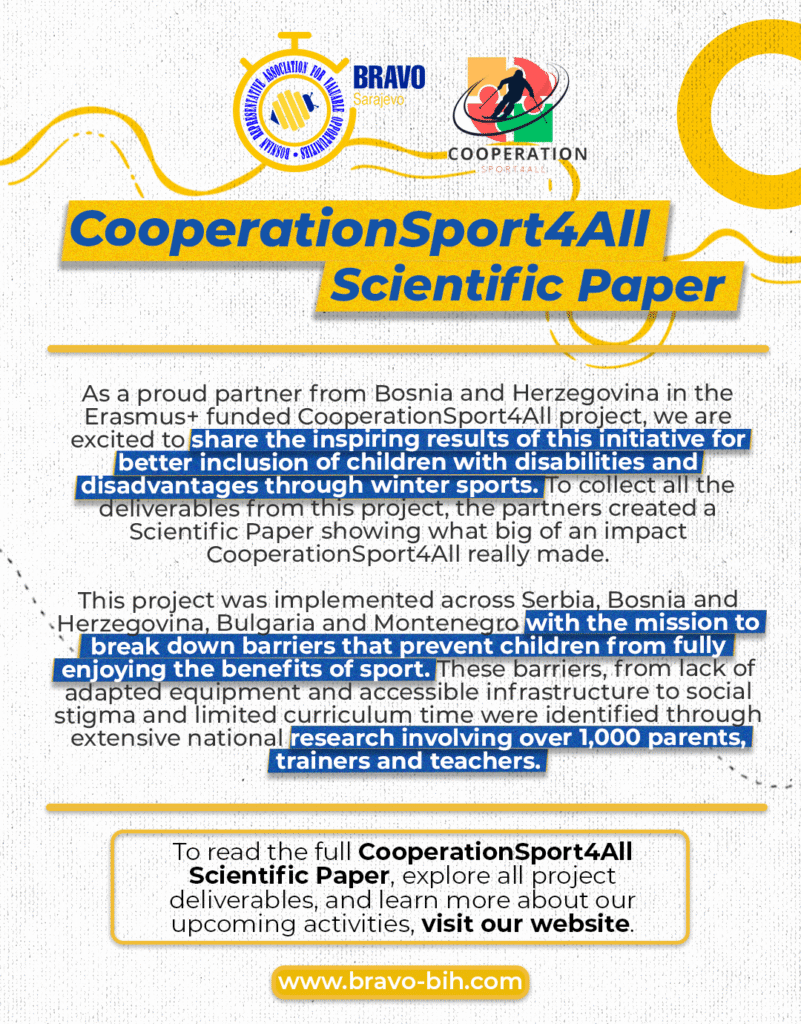
As a proud partner from Bosnia and Herzegovina in the Erasmus+ funded CooperationSport4All project, we are excited to share the inspiring results of this initiative for better inclusion of children with disabilities and disadvantages through winter sports. To collect all the deliverables from this project, the partners created a Scientific Paper showing what big of an impact CooperationSport4All really made. This project was implemented across Serbia, Bosnia and Herzegovina, Bulgaria and Montenegro with the mission to break down barriers that prevent children from fully enjoying the benefits of sport.
These barriers, from lack of adapted equipment and accessible infrastructure to social stigma and limited curriculum time were identified through extensive national research involving over 1,000 parents, trainers and teachers.In response, the project delivered Training for Trainers programmes, educating more than 40 trainers on inclusive practices, emotional intelligence and adaptive sports methods. Two major trainings in Kopaonik (March 2024) and Sarajevo (October 2024) provided both theoretical foundations and hands-on experience in creating games that welcome every child regardless of ability.
The impact went beyond the direct participants, as these trainers passed on their knowledge to others in their communities, creating a network committed to inclusion.
A highlight of the project was the Mountain Games for Everyone, held in March 2025 in Kopaonik, Serbia. This inclusive event brought together 55 children from the partner countries for snow activities, ski lessons, ecological workshops and creative sessions. Children who often face exclusion became active confident participants, forming friendships and strengthening social bonds. For many, it was their first opportunity to experience sport in such a welcoming and adapted environment.
The results of the project are clear: when we combine research, capacity building and practical implementation, we can break down barriers and create equal opportunities for all children. In Bosnia and Herzegovina, where physical and social barriers remain significant, this work is especially important and it has shown that change is possible when communities, trainers and institutions work together.
Next up we are preparing a major event to continue spreading the message of inclusion: the recording of a short podcast with Paralympians from Bosnia and Herzegovina, where they will share their stories, experiences and hopes for the future of inclusive sports.
ABOUT THE PROJECT
Promoting sports and emphasizing their significance in daily life encourages social inclusion and well-being for all ages, genders, and backgrounds. The project uses sports to educate children and youth, instill good values, and train sports workers and coaches.
The main goals are to build basic groups, share best practices from other countries, promote social inclusion through sports (focusing on children with developmental disabilities and those facing disadvantages), and foster positive values such as team spirit. Youth and sports professionals will benefit from the transfer of expert knowledge.
The project will hold workshops, events, and programs that use sports for informal education and advocate for changes in public policy and legislation. The project will target various populations to address the often-overlooked importance of physical activity in public health policies.
The Global Strategy on Diet, Physical Activity, and Health emphasizes the importance of school policies and programs that promote healthy habits and physical exercise for children, youth, and the community. Sports improve motor skills, confidence, and resilience in children with disabilities and special needs. Physical education and school sports encourage physical exercise and an active lifestyle, enhancing public health. Sports can prevent diseases, improve mental and cognitive health, and engage older adults.
This project will use non-traditional educational methods to create engaging activities and events that teach people about inclusion, gender equality, and healthy habits through sports. This approach demonstrates that sports can be inclusive, innovative, and creative for different learners and communities.
